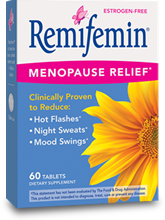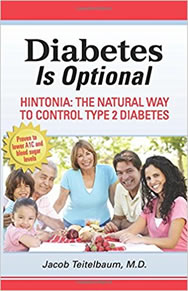Night Sweats? No Sweat!

Are you waking up during the night in a sweat? It's no fun. And trying to fall back asleep when your bedclothes, sheets, and pillowcase are wet and clammy can be a challenge. Fortunately, you can rid yourself of night sweats. As a bonus, once you've treated the underlying causes, you're going to feel much better overall!
There are four key causes of night sweats:
- Deficiencies of reproductive hormones, such as estrogen, progesterone, and testosterone.
- Infections, such as candida.
- Drops in blood sugar from inadequate adrenal function.
- Nighttime acid reflux.
In this four-part series I'll take a look at all of these and show you how to address them. Don't be surprised if more than one underlying process is contributing.
A helpful tip for all of these? Sweating is controlled by our hypothalamic autonomic control center. This can be stabilized using a special herb called black cohosh. Enzymatic Therapy makes a black cohosh product called Remifemin, and this is the only brand that research has shown to be effective. Take two twice a day and give it two months to work. Then the dose can often be lowered. This also helps the daytime sweats.
Let's look at the first of the key causes, reproductive hormone deficiencies.
Optimizing Reproductive Hormones In Women
You might be surprised at the health issues that can be caused by deficiencies in a woman's reproductive hormones. For instance:
- Inadequate estrogen can cause poor sleep, sweats, brain fog, vaginal dryness and depression.
- Inadequate progesterone can cause anxiety and poor sleep.
- Inadequate testosterone, even in women, can cause weakness, loss of libido, and pain.
The problem is that most doctors won't diagnose estrogen or progesterone deficiency until a woman's menses have stopped, or her blood tests have become overtly abnormal. Unfortunately, estrogen and progesterone deficiency have usually already been present for 5-12 years before these physiological changes develop.
Have you had a hysterectomy or tubal ligation? Hysterectomy can trigger estrogen and progesterone deficiency about 1-2 years afterward — even if you're a woman as young as your early 20's! Most doctors aren't familiar with this old research by Philip Sarrel (emeritus professor in the Yale Departments of Obstetrics, Gynecology & Reproductive Sciences) and wrongly presume that if a woman's ovaries are intact then there's no problem.
This is not the case. Especially in younger women, where suddenly being thrown into menopause can trigger major problems, including fibromyalgia. Sadly, I find hysterectomies to be more frequent in young women with a childhood history of sexual abuse. It seems almost as if the psyche is trying to do a "clean sweep." Other techniques to deal with the trauma such as EFT (Emotional Freedom Technique) can be very helpful.
How Women Can Tell That They Need Bioidentical Estrogen Support
Instead of relying on blood tests, I find one single question to be most helpful: "Are your sleep or fibromyalgia symptoms worse the week around your menses?" If your sleep, brain fog, pain, and fatigue are worse around your menses, when your estrogen and progesterone are at their lowest, then this suggests that deficiencies of these hormones are contributing to your symptoms and a trial of bioidentical estrogen and progesterone is warranted. You can use this just around your menses, or even throughout the month, depending on which leaves you feeling better.
If you're simply having irritability around your menses (at any age), this suggests low progesterone. When this is true for a patient of mine, I prescribe Prometrium 100 mg 1 capsule once or twice daily around her menses, adjusting the dose as feels best. Alternatively, you can use a compounded progesterone cream, with 30-60 mg a day being optimal for most women. This can do wonders for PMS, anxiety and sleep, and you can use a low dose through the rest of the month as well.
Some woman suffer refractory migraines mostly during ovulation and around their menses. This is often triggered by shifts in estrogen and progesterone. In these cases you can help prevent migraines by using estrogen patches along with the Prometrium prescription during these periods.
Some doctors won't give progesterone to women who have had a hysterectomy, because they think the progesterone is only needed to prevent uterine cancer from estrogen treatment. But they're wrong. Progesterone is a critical hormone for sleep and maintaining a calm mood. So I recommend it as part of hormone replacement even if a woman has had a hysterectomy
If testosterone levels are in the lowest one third of the normal range, adding testosterone can be very helpful.
Over 70% of women with fibromyalgia, as well as those in menopause, are in the lowest 30th percentile for testosterone. Using bioidentical testosterone by prescription (one 1/2-5 mg daily) has been shown to not only improve function, but also decrease fibromyalgia pain. This was shown in a study on women with fibromyalgia done by Prof. Hilary White at Dartmouth University. It can also help improve libido. (In a separate study that my team conducted, we asked women with fibromyalgia how their libido was. 73% of the participants answered "What libido?")
For treatment, I recommend using only bioidentical hormones and not the synthetics. The bioidenticals are very healthy while the synthetics are quite toxic. I typically use compounded mixes that contain BiEst, progesterone, and testosterone (you need to get a prescription for this from a holistic physician). Alternatively, the standard estrogen patches (0.1 mg) and Prometrium (100-200 mg daily) are both bioidentical and can be obtained at a regular pharmacy. And it's often covered by insurance. Unfortunately, this doesn't supply the testosterone you still need.
The overall research in this area suggests that bioidentical hormones are very healthy, and are actually associated with a lower risk of breast cancer. It was the toxic synthetics that caused problems.
If you prefer not to use hormones, eating a handful of edamame each day around your menses can be helpful, as can the black cohosh. (Again, remember to use only the Remifemin brand, as this is the only form research has shown to be effective.)
Treating Testosterone Deficiency in Men
Inadequate testosterone levels in men, even if blood levels are "normal," often causes night sweats. (I put "normal" in quotes because that medical classification simply means that you aren't in the lowest 2% of the population, which often includes 80 year-old men — an absurd way to define the normal range for younger men.) Low testosterone often causes night sweats. It can also trigger erectile dysfunction, low libido, diabetes with high blood pressure and elevated cholesterol (called metabolic syndrome), weight gain with a "spare tire" around your middle, and a generalized poor mood and decrease in motivation.
Studies show that using bioidentical testosterone (not to be confused with the toxic chemicals bodybuilders sometimes use) helps bring down blood sugar, blood pressure, and cholesterol while helping many of the other symptoms. It also seems to be associated with improved overall health and longer life.
I don't recommend testosterone shots or synthetic testosterone. Instead, if you're a man over 55 who doesn't plan to have more children you should use compounded testosterone cream, switching over to the subcutaneous pallets if you find it more convenient and you feel better on it. You should vary the location on your skin where you apply the cream each day. Otherwise over time your skin may stop absorbing the cream.
If you're a man under 55, you should begin by taking the prescription medicine clomiphene, which stimulates the body's own production of testosterone. Take half of a 50 mg tablet each night, and repeat the testosterone level test the morning after the seventh dose. If it's over 550 ng/dl, then the clomiphene by itself may be adequate, and you can try reducing the dose to just a half tablet a night, or a full tablet only every Monday, Wednesday, and Friday night.
For those with difficulty with elevated blood sugars, a wonderful new herb called hintonia latiflora (sold as Sucontral D) can be very helpful. It lowers glycosylated hemoglobin's by an average of almost 1%.
I'm so impressed with hintonia, I wrote a book about it, "Diabetes Is Optional"! If you have diabetes or prediabetes, I invite you to read it. You can find it here on Amazon.

Jacob Teitelbaum, M.D. is one of the most frequently quoted post viral CFS, fibromyalgia, energy, sleep and pain medical authorities in the world. He is the author of 12 books including You Can Heal from Long Covid, the best-selling From Fatigued to Fantastic!, Pain Free 1-2-3, The Complete Guide to Beating Sugar Addiction, Real Cause Real Cure, The Fatigue and Fibromyalgia Solution, and the popular free Smart Phone app Cures A-Z. He is the lead author of eight research studies and three medical textbook chapters on effective treatment for fibromyalgia and chronic fatigue syndrome. Dr. Teitelbaum appears often as a guest on news and talk shows nationwide, including past appearances on Good Morning America, The Dr. Oz Show, Oprah & Friends, CNN, and FoxNewsHealth.
Websites: Vitality101.com | EndFatigue.com
Facebook Support Group: Recovering from Fibromyalgia, Chronic Fatigue, and Long COVID
Facebook Page | Instagram


